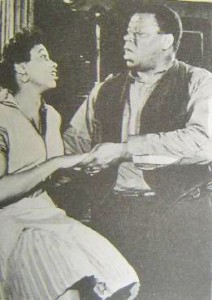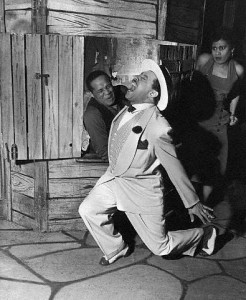Riverwalk Jazz presents the concluding episode of George Gershwin’s folk opera, Porgy and Bess, featuring acting legend William Warfield as narrator with The Jim Cullum Jazz Band performing their original jazz transcription of Porgy and Bess, recorded live at The Landing in San Antonio in 1992. Among his many accolades, Mr. Warfield is known for his stage role as Porgy opposite Leontyne Price.

Leontyne Price and William Warfield as Porgy in a 1952 production of Porgy and Bess Photo courtesy npr.org
Catfish Row, a black-populated fishing village in South Carolina in 1912, is the setting for the story of Porgy and Bess. Bess is a woman with a past struggling to free herself from her no good and violent man Crown. Porgy is a crippled beggar who gets around on a goat cart. He pledges his love for Bess in the face of incredible obstacles—the disapproval of her friends and family, the threatened return of Crown, and the temptations of a local drug dealer Sportin' Life. By the end of Part One, Bess and Porgy have fallen in love, and Porgy sings to her, "Bess, You is My Woman Now."
As the scene opens on the concluding episode, the people of Catfish Row have traveled to a nearby sea island where a party is going full blast to the sound of "I Ain't Got No Shame." Sportin' Life brings a little philosophy to the gathering by singing that "..what you read in the Bible, It Ain't Necessarily So."
Bess has a disturbing encounter with Crown who is hiding out on the island, and a week later she comes down with a mysterious illness. Her friend Serena tries to cure her with an incantation to 'Doctor Jesus.' Bess recovers and tells Porgy how much she fears Crown and promises her love to him, singing "I Loves You, Porgy, don't let him take me."
A terrible storm blows up and everyone takes refuge in Clara's room. The wind rattles the shutters and fearing destruction, they sing "Oh, Dere's Somebody Knocking at De Do'." Slowly they realize that somebody really is knocking on the door—and it's Crown! They try to keep him out, but he bursts into the room to seize Bess. He defies them all, laughing and singing "A Red-Headed Woman Makes the Choo Choo Jump the Track."
In the powerful climax of the story, in a life and death struggle, Porgy kills Crown with his own knife. The police arrive and take Porgy in for questioning; in his absence Sportin' Life convinces Bess that Porgy will be in jail for a long, long time. Distraught, she succumbs to Sportin' Life's offer of 'happy dust' and Bess reluctantly agrees to go with him to New York. "There's a Boat Dat's Leavin' Soon for New York," he sings tantalizingly, and they're gone.
Porgy returns and fearing that Bess is dead, cries, "Oh, Bess, Oh Where's My Bess?" When Porgy learns that Bess isn't dead, he's ecstatic and calls for his goat cart to set out and follow Bess a thousand miles to New York. Porgy's enormous strength of will comes out in the last speech Mr. Warfield delivers:
"Now it's a fact that even for a crippled man in a goat cart, a thousand miles isn't very far where the heart is concerned. And Porgy, one of the greatest characters in music, has enough heart for ten men in love. He cries, 'Oh, Lawd, I'm On My Way.' And somehow, we know he's going to make it."
Photo credit for home page teaser image:
1942 Souvenier Program courtesy Dubois Learning Center
Text based on Riverwalk Jazz script by Margaret Moos Pick and Jim Cullum ©2012



